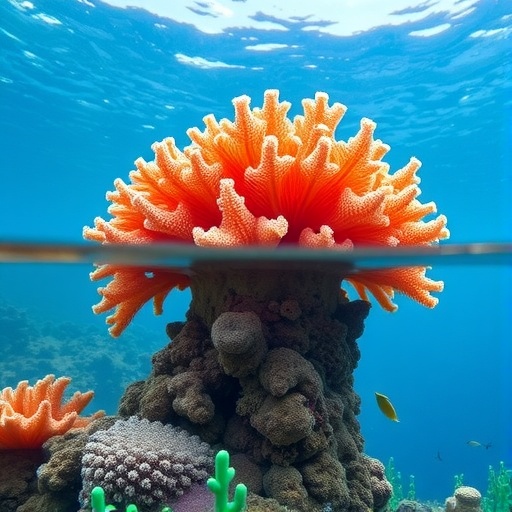Coral reefs, often hailed as the rainforests of the sea, face an unprecedented crisis as rising ocean temperatures driven by climate change relentlessly threaten their survival. These ecosystems, which support an astounding diversity of marine life, have been increasingly subjected to mass bleaching events—episodes where corals expel the symbiotic algae critical for their energy production, leading to widespread mortality. The frequency and severity of these events have intensified in recent decades, pushing coral assemblages to the brink of collapse. Yet, amidst this distressing scenario, scientists have begun to explore a remarkable possibility: nature itself may harbor solutions that can be harnessed to safeguard these vital marine habitats.
A groundbreaking study conducted by researchers at the University of Technology Sydney (UTS) illuminates the potential of so-called ‘super corals’—coral specimens that have naturally adapted to thrive in exceptionally harsh environments. These resilient corals exhibit traits that enable them to endure fluctuations in temperature, salinity, and oxygen levels that would be lethal to typical reef-building corals. The research, recently published in the esteemed journal Science Advances, provides compelling experimental evidence that these thermotolerant corals retain their heat resilience even after extended exposure to more stable, conventional reef habitats. This discovery could revolutionize coral restoration practices worldwide.
The study focused on coral populations inhabiting mangrove lagoons near Low Isles on the Great Barrier Reef, an ecosystem notorious for its extreme environmental conditions. Mangrove lagoons experience wide-ranging temperature fluctuations, hypoxic episodes due to low oxygen, and varying salinity levels—stressors that select for hardier coral genotypes. By transplanting these mangrove-derived corals approximately one kilometre away to more stable reef environments and meticulously monitoring their physiological and genetic responses over a year, the researchers provide one of the most comprehensive longitudinal datasets on coral adaptation and plasticity ever reported.
Remarkably, despite being transferred to conditions that are less challenging, the transplanted corals did not relinquish their elevated thermal tolerance. This resilience suggests an intrinsic biological adaptation rather than a mere acclimatization to their original environment—an insight further substantiated by gene expression analyses. The study revealed that these corals upregulate genes associated with DNA repair mechanisms, metabolic regulation, and cellular homeostasis pathways, all of which are crucial for mitigating heat-induced cellular damage. Such molecular fortifications imply a robust, heritable thermotolerant phenotype that persists beyond environmental influence.
Dr. Christine Roper, the lead researcher, emphasized the importance of these findings for coral conservation: “Traditional restoration methods often struggle to keep pace with the rate of climate change-induced stressors impacting reefs. Our work demonstrates that naturally heat-tolerant corals can be transplanted and maintain their resilience, potentially serving as a biological bulwark against warming seas.” The analogy Dr. Roper draws between these efforts and agricultural strategies—where drought-resistant crops are developed to sustain food production under climate stress—highlights a pragmatic approach to managing climate impacts across ecosystems.
This strategy of leveraging stress-tolerant corals is especially promising for reefs like Low Isles, which hold significant ecological and economic value, supporting vibrant tourism industries and local fisheries. Enhancing the resilience of such reefs not only safeguards biodiversity but also preserves livelihoods dependent on healthy coral ecosystems. However, the researchers caution that introducing corals to new environments is not without risks; ecological disruptions and the possibility of maladaptation remain concerns that demand thorough evaluation through risk-benefit analyses.
Despite the challenges, Dr. Roper underscores that leveraging super corals is not a standalone solution but one critical tool within a broader conservation toolkit. “While these corals can help us buy time, the underlying driver of reef degradation—climate change—must be addressed through urgent emission reductions,” she stated. The preservation of coral reefs hinges on global climate action alongside innovative restoration approaches. In this context, the study injects a dose of optimism and scientific rigor into ongoing efforts to preserve marine ecosystems.
Coral reefs underpin approximately 25 percent of all marine biodiversity and contribute billions of dollars annually through ecosystem services, including fisheries, tourism, and coastal protection. The stakes are enormous, as reefs buffer shorelines from storm surges and sustain food security for millions globally. The emerging research on super corals adds a new dimension to reef restoration strategies, emphasizing evolutionary adaptability as a beacon of hope amidst alarming environmental trends.
The molecular insights uncovered in this study are particularly exciting. The activation of DNA repair pathways in transplanted corals highlights an advanced cellular defense system that counters the widespread genomic damage typically caused by thermal stress. The maintenance of metabolic homeostasis further ensures that cellular energy demands are met even under duress, preventing collapse of critical physiological functions. Collectively, these adaptations underscore a deep-rooted biological foundation for resilience that transcends environmental plasticity.
Beyond the laboratory and field observations, the implications of these findings extend to policy and reef management strategies. Integrating stress-tolerant corals into reef restoration initiatives can shift paradigms from passive recovery to proactive enhancement of reef resilience. This necessitates interdisciplinary collaboration among marine biologists, geneticists, policy makers, and local stakeholders to optimize transplantation sites, genetic diversity, and minimize ecological risks.
The study also opens new avenues for research, prompting questions about the heritability of these thermotolerant traits and their long-term stability under escalating climate stress. Further investigations into the genetic basis and potential epigenetic modifications associated with super corals could inform selective breeding or assisted evolution programs designed to fortify vulnerable reefs worldwide.
Finally, the researchers’ transparent declaration of no competing interests reinforces the integrity of their work, which stands as a testament to innovative science motivated by urgent conservation needs. By harnessing the extraordinary resilience evolved by corals in nature’s most extreme niches, humanity gains powerful new tools in the race to save the planet’s coral reefs from the ravages of climate change.
Subject of Research: Animals
Article Title: Coral thermotolerance retained following year-long exposure to a novel environment
News Publication Date: 8-Aug-2025
Web References: 10.1126/sciadv.adu3858
References: Science Advances, DOI: 10.1126/sciadv.adu3858
Keywords: coral reefs, climate change, super corals, thermal tolerance, restoration ecology, gene expression, DNA repair, coral bleaching, marine conservation, Great Barrier Reef, mangrove lagoons, aquatic stress adaptation




